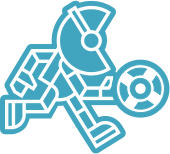You’re more than likely to not regret reading this post. So, what’s this all about then?
A good few years ago, I turned my resume into a Facebook Messenger chatbot, also called a “messenger bot,” “chatbot” or “Facebook bot”.
My goal was to create something simple so I figured I’d tackle a subject I know well – me! I figured out a way to engage with people on mass by accident. I used it to help build my personal brand, get interviews — and meet people I really look up to.
But, enough about me.
I believe chatbots are still a relative newcomer to the recruitment space. That’s why it’s an exciting time to dive in and learn all about them.
Automating the war for talent
In order to win the war for talent, candidate experience has become increasingly important to attract talent. So let’s look at the problem…
Workopolis found 43% of candidates never hear back from a company after one touchpoint. On the flip side, it’s a challenge for employers to communicate well with all their candidates.
One way of breaking through this is to be both cunning and lazy by employing ‘hyper-personalized automation’ in the form of a chatbot to your candidate experience. After all, creativity is the last legal unfair advantage over the competition and you should abuse it with reckless abandon.
What is a chatbot you ask?
Well, a chatbot is a service, powered by rules and sometimes artificial intelligence, that you interact with via a chat interface. The service could be any number of things, ranging from functional to fun, and it could live in any major chat product (Facebook Messenger, Slack, Telegram, Text Messages, etc.).
Why are they such a big opportunity?
You’re probably wondering “Why does anyone care about chatbots? They just look like simple text-based services… what’s the big deal?”
I’ll tell you why you should care about chatbots.
It’s because for the first time ever people are using messenger apps more than they are using social networks.
And it shows no signs in stopping there. By 2020, Gartner predicts the average person will have more conversations with chatbots than with their spouse. So, logically, if you want to engage with talent online, you want to engage where the people are. That place is now inside messenger apps.
The #1 request from job seekers is “more communication.”
It’s true. Candidates are comfortable interacting with a chatbot. In a survey by Allegis, 58% of candidates were comfortable interacting with a chatbot in the early stages of the application process. An even larger percentage – 66% – were comfortable with chatbots taking care of interview scheduling and preparation. Randstad found 82% of job seekers believe the ideal recruiter interaction is a mix of technology and human interaction.
Less time spent on repetitive tasks
For example:
- handling job applications
- collecting information from candidates such as their resume and contact information
- asking screening questions about candidates’ experience, knowledge, and skills
- ranking candidates on metrics such as qualifications, engagement, or recent activity
- answering FAQs about the job and the application process
- scheduling an interview with a human
All of this information can be collected in real-time and simultaneously from hundreds to thousands of candidates at a time. This information can then be fed into your ATS or sent directly to a human recruiter to follow up.
Every time a candidate uses your bot, they are making decisions. Each decision gives you very valuable data on who that person is and what they want. Data can also be used to personalize a candidate’s experience after you know who they are and what they are interested in. Bots allow you to deliver personalization at scale.
Save uber time and money
It’s estimated that a chatbot can automate up to 80% of top-funnel recruitment activities. According to SHRM, the average cost of hire is $4,129 and the average time to hire is 42 days.
By automating a large part of qualifying and scheduling while simultaneously keeping candidates engaged, a chatbot can dramatically lower both the cost of hire and time to hire.
Remember, in order to win the war for talent, candidate experience has become increasingly important to attract talent.
Automating your candidate experience will be almost impossible for candidates to forget. Being daring and distinct provides a commanding competitive advantage.
Proceed with daring, and you will find companions, advocates, and talent from every corner of the globe.
Have fun out there!
